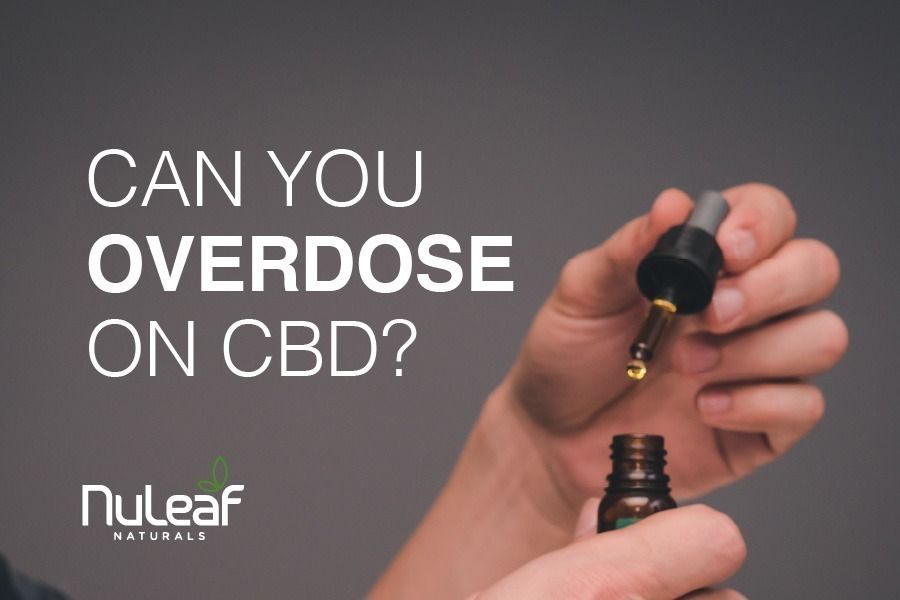Can You Overdose on CBD?

CBD, or cannabidiol, is not known to cause any lethal overdose, and people can tolerate high doses without issue.
On the other hand, taking too much of it may cause side effects. So how much should you take? Is there any way that CBD can interact with pharmaceutical drugs?
In this blog post, we’ll look at all the preventive measures you can consider while dosing CBD and what to do if you overdid it.
Safe Dose of CBD
According to a 2011 study on CBD toxicity, the toxic dose of CBD is somewhere around 20,000 mg taken at once.[1] A typical bottle of CBD tincture contains around 100 to 1500 mg of CBD, depending on the potency. Gummies and CBD oil will also contain varying amounts of CBD.
To ingest “toxic” levels of CBD, you need to consume at least 13 to 200 bottles of CBD tincture at once. This is an enormous amount of CBD that no person in their right mind would ever consider.
There are different recommended doses of CBD based on your wellness goals. Consuming CBD in smaller quantities before gradually increasing the level is crucial. You can also consult a doctor with experience in CBD to determine your dosage.
Why People Use CBD Instead of THC
Cannabidiol is a natural substance in hemp and cannabis plants that may provide wellness support under certain conditions*. Unlike THC, CBD has no intoxicating or psychoactive properties.
CBD works by interacting with cannabinoid receptors. The body has two cannabinoid receptors:
- CB1 regulates movement, pain, emotion, mood, thinking, appetite, and memories
- CB2 regulates inflammation and pain.
CBD Adverse Effects
When you consume a toxic dose of CBD or take more than the daily recommended dose, it can lead to several adverse effects, which are:
- Extreme drowsiness and lethargy
- Upset stomach, nausea, or diarrhea
- Feelings of disorientation
- Effects on tumor cells
- May cause hormonal changes
It’s important to consider that these findings were taken from research in monkeys, as a study in humans would be unethical. Despite the risks of taking CBD at extremely high doses, the World Health Organization (WHO) has deemed CBD as having no significant side effects or risk of dependency.
Why The Quality of Your CBD Matters
It’s important to pay attention to the quality of your CBD products. When shopping around for CBD, you should look for trusted suppliers that can provide evidence of test results from independent parties.
Ask for your supplier to send you a Certificate of Analysis or COA that was released by a third-party testing facility to verify the components and concentration inside their products. In the US, the THC content must be less than 0.3% to be considered legal CBD.
Not all CBD products are held to the same standard; some may have more THC than advertised. Higher THC levels in these products may increase the likelihood of unwanted effects.
If you’re consuming normal amounts of CBD and experiencing side effects, it might be due to higher THC levels or impurities in your CBD products.
At NuLeaf Naturals, we third-party lab test all of our products and make their Certificates of Analysis available for our customers to ensure our products are only of the highest quality and purity.
CBD Interactions with Medications
Although rare, CBD can also cause side effects when consumed with certain medications. This is why you must consult your doctor before starting a CBD regimen.
These are some known drug interactions with CBD:
- Cancer treatment drugs such as crizotinib, dasatinib, or everolimus.
- Medications to prevent infections such as erythromycin, halofantrine, or quinine.
- Medications to treat high cholesterol such as simvastatin.
- Medications to treat heart disease and blood vessel conditions such as amiodarone or clopidogrel.
- Drugs affecting the central nervous system, such as buspirone or fentanyl.
- Medications to treat nausea.
- Immunosuppressants.
- Medications to treat urinary tract conditions.
The side effects of the interaction between CBD and these medications are similar to overdosing, so sometimes it’s hard to pinpoint the cause. These side effects are:
- Drowsiness
- Nausea
- Fatigue
- Diarrhea
- Appetite loss
- Loss of drug effectiveness
Minimizing CBD Risks
There are ways to minimize the risks of consuming too much CBD. To avoid overdoing it and experiencing side effects from CBD consumption, you can practice some of these safe steps:
- Don’t take CBD until you’re an adult. Special cases where doctors prescribe it may be applicable.
- Avoid using it while you’re pregnant.
- Start with low-potency products or products with lower CBD content and gradually adjust your dosage.
- Stay away from synthetic products, and stick to natural products.
Final Thoughts
While the side effects of CBD are generally very minimal, in general, it takes a dosage of many times more than is recommended to cause any adverse effects. The overall risk of overdosing on CBD is very low. However, as with all-natural supplements, it’s always recommended to consult a doctor before starting a new routine.
*This statement has not been evaluated by the Food and Drug Administration (FDA). This product is not intended to diagnose, treat, cure, or prevent any disease.
References
[1] Safety and side effects of cannabidiol, a Cannabis sativa constituent
Mateus Machado Bergamaschi, Regina Helena Costa Queiroz, Antonio Waldo Zuardi, José Alexandre S Crippa